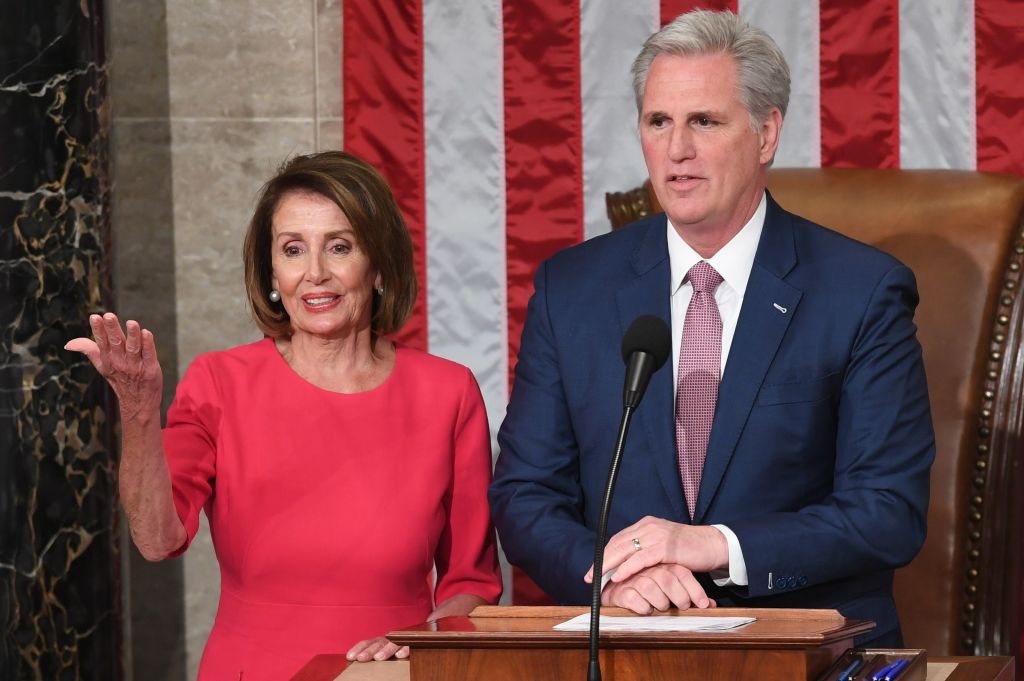Republican House minority leader Kevin McCarthy doesn’t like Nancy Pelosi. In this, he’s hardly alone — the list of those who don’t like Nancy Pelosi is long and includes Republicans, Democrats, moderates, progressives, intelligence officials, hair stylists, health nuts, probably a few farm animals and single-cell organisms. America’s speaker of the House is polarizing in the same way that a rocket booster might be said to be noisy.
Yet in McCarthy’s case, he has good reason not to like Pelosi: she doesn’t much like him either. After McCarthy last year criticized a mask mandate in the House of Representatives, Pelosi called him a “moron.” When he accused her of gagging Democrats who were concerned about illegal immigration, she retorted, “I don’t even know what he’s talking about — and I don’t know if he does.” Her opinion of McCarthy seems to be that he’s a few tacos short of a combo platter. Her spokesman has called him “an uninspiring and incoherent politician.”
Much is at stake in this year’s midterm elections — control of Congress, Joe Biden’s agenda, the very fate of democracy as the Washington Post knows it — yet at the highest levels of power this fight is also personal. If the Democrats maintain control of the House (unlikely at this point), it will be seen as an indictment of McCarthy, who will likely face a leadership challenge while hated Aunt Nancy lives on. If the Republicans take control of the House (as seems far more probable), Pelosi will have to hand the gavel to a man who once joked about assaulting her with it.
She’ll also likely retire. House Democrats have been restive about her leadership for close to a decade, which briefly culminated back in 2019 in a progressive rebellion. Yet Pelosi brutally put down that insurgency, isolating the AOC-led Squad and humiliating them, a warning to any others who would challenge her leadership. Eighteen months later, she seemed vindicated, as conventional wisdom held that Democrats would have fared much better in 2020 had progressives not dragged them leftward. Whatever you think of Pelosi, there’s simply no questioning her knack as a vote-counter and her reading of the political winds.
Yet this year is different, and everyone knows it. Already, in San Francisco, there is quiet jostling underway over who will replace Pelosi if she steps down. This is what makes the feud between her and McCarthy so compelling: both of their careers are on the line; both will walk into a room on Tuesday and only one will walk out. And that probably suits them both just fine. McCarthy, after all, reportedly views Pelosi as having wrecked the civic traditions of the House in order to cling to power. While Pelosi views McCarthy as a lightweight gamely playing footsie with the January 6 mob.
What’s scary is that they may both be onto something. Pelosi got on much better with her previous Republican counterparts than she does with McCarthy. Yet even John Boehner, in that Mean Girls burn book-cum-memoir he published last year, noted her ruthlessness, saying, “Even if I wanted to, I could never operate like Pelosi did.” Certainly, Pelosi’s legacy will be a Congress far more partisan and top-down than when she came in. McCarthy, meanwhile, can sometimes come off like Mr. Bean has just stumbled into a position of legislative power. He’s been effective at raising money and managing the GOP minority, but then minorities are always easier to wrangle than majorities.
The storied days of political bonhomie, when Tip O’Neill and Ronald Reagan would set aside their differences at 5 p.m. and head to Chuck E. Cheese or whatever, were always a bit exaggerated. (O’Neill in 1987 called Reagan “the worst US president” and a “lazy fellow.”) Yet even if American politics has always been a full-contact sport, the bitterness of the Pelosi/McCarthy relationship stands out. It’s a reflection of how divided the Congress and thus much of the country has become. We’ll see on Tuesday who gets to wield that unnecessarily large gavel — and who gets sent home for good.

























